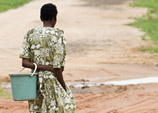Clean water saves lives
Published:
Currently around 1.1 billion people around the world don’t have access to clean drinking water.
Currently around 1.1 billion people around the world don't have access to clean drinking water. Diseases carried by bad sanitation and water supplies cause 80% of illness and death in developing countries. Every eight seconds they kill a child.
 It is statistics like this that motivate environmental engineer Dr Caetano Dorea. 'Most of the time things we take for granted here, such as turning on a tap and getting a clean glass of water, do not apply in developing countries. Part of my research is using processes that might not be considered hi-tech here to improve people's lives in places where they are deprived of these basic technologies.'
It is statistics like this that motivate environmental engineer Dr Caetano Dorea. 'Most of the time things we take for granted here, such as turning on a tap and getting a clean glass of water, do not apply in developing countries. Part of my research is using processes that might not be considered hi-tech here to improve people's lives in places where they are deprived of these basic technologies.'
Dr Dorea's research interests are in chemical and (micro)biological water and wastewater treatment processes and his work regularly takes him out of the lab and into the field. 'That's the best part of my job. I have always been of the view that if you don't test it in field conditions then it's just academic study and it's not really an improvement to people's lives. I always try to make sure that my work is not only tested in a lab, but we do field trials because you don't have a lab when you're in the field, so you have to make sure the prototype does work.'
Field work involves an interdisciplinary approach that Dr Dorea finds very beneficial. 'Sometimes I'm looking at new devices to detect pathogens in water and so I need to collaborate with microbiologists. I can engineer the device but need their specialist knowledge. Recently I was in Indonesia working with social scientists to understand how to best introduce a technology that people can effectively use in their community. For example, if we're going to install a community water supply in a village that has never had water before, technology will only make a difference up to a certain point, because the community will have to maintain it. If we don't have the community support then it may be good technology but it won't work.'
First published:
<< Features

